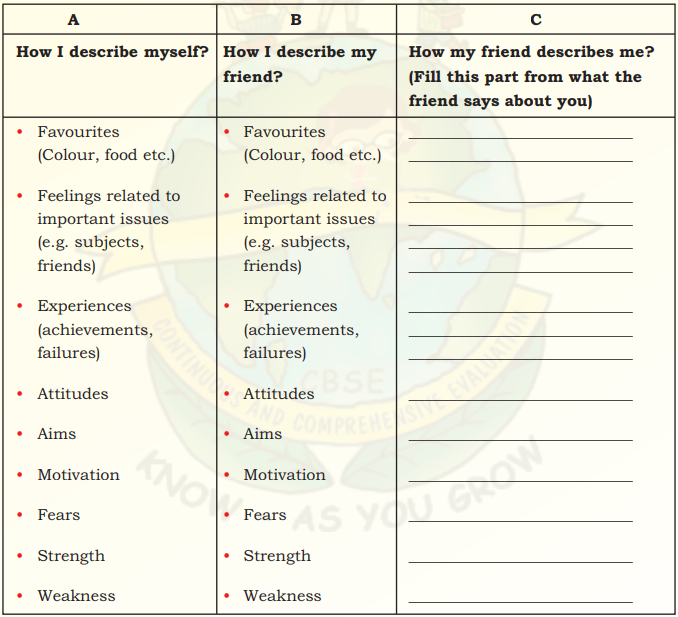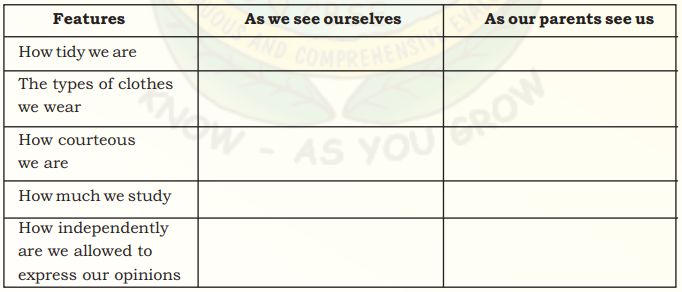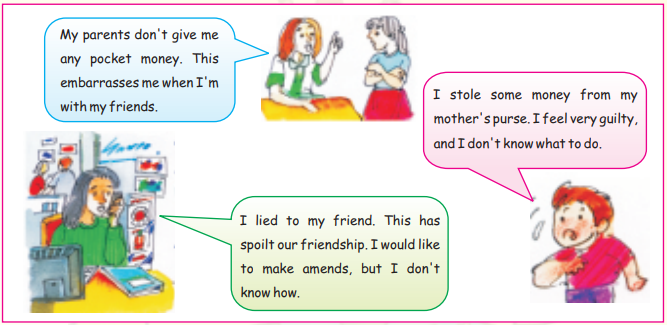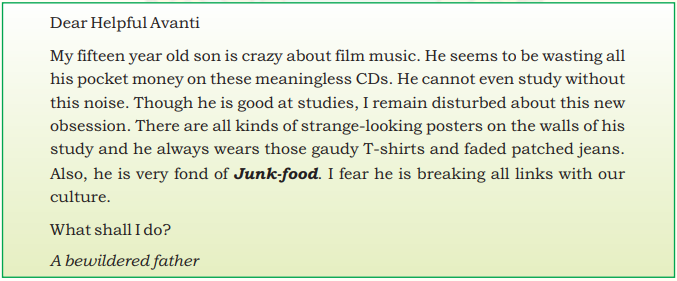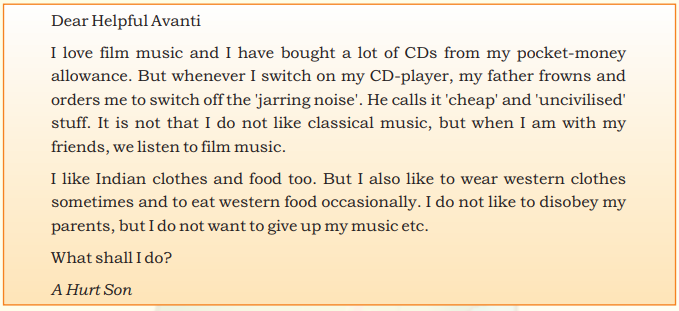NCERT Solutions for Class 9 English Beehive Chapter 1 The Fun They Had are part of NCERT Solutions for Class 9 English. Here we have given NCERT Solutions for Class 9 English Beehive Chapter 1 The Fun They Had.
| Board | CBSE |
| Textbook | NCERT |
| Class | Class 9 |
| Subject | English Beehive |
| Chapter | Chapter 1 |
| Chapter Name | The Fun They Had |
| Category | NCERT Solutions |
NCERT Solutions for Class 9 English Beehive Chapter 1 The Fun They Had
TEXTUAL EXERCISES
(Page 10)
THINKING ABOUT THE TEXT
Activity : Calculate how many years and months ahead from now Margie’s diary entry is.
Answer:
Margie’s diary entry is 13 days and 149 years ahead as on 4 May, 2008.
I. Answer these questions in a few words or a couple of sentences each.
- How old are Margie and Tommy ?
- What did Margie write in her diary ?
- Had Margie ever seen a hook before ?
- What things about the book did she find strange ?
- What do you think a telebook is ?
- Where was Margie’s school ? Did she have any classmates ?
- What subjects did Margie and Tommy learn ?
Answers
- Margie was eleven and Tommy was thirteen years old.
- She wrote in her diary : Today (17 May, 2157) Tommy found a real book’.
- No, Margie had never seen a book before. If she had, she could not have written the sentence in her diary.
- She found its yellow and wrinkled pages strange. She also found the words strange. It was so as they stood still instead of moving.
- A telebook is a book meant only for television. It is what moves on a television screen having the qualities of a book.
- Margie’s school was her own room. Her mechanical teacher (computer) was placed therein to teach her. She did not have any classmates.
- Margie learnt Geography and Mathematics. Tommy learnt History and Mathematics.
II. Answer the following with reference to the story.
1. “I wouldn’t throw it away.”
- Who says these words ?
- What does ‘it’ refer to ?
- What is it being compared with by the speaker ?
2. “Sure they had a teacher, but it wasn’t a regular teacher. It was a man.”
- Who does ‘they’ refer to ?
- What does ‘regular’ mean here ?
- What is it contrasted with ?
Answers
1. (i) Margie says it.
(ii) ‘It’ refers to the book.
(iii) It is being compared with the television screen or the telebook.
2. (i) ‘They’ refers to Tommy’s grandfather’s grandfather.
(ii) ‘Regular’ here means who is present daily and is never absent.
(iii) It is contrasted with a television teacher (mechanical teacher).
III. Answer each of these questions in a short paragraph (about 30 words).
1. What kind of teachers did Margie and Tommy have ?
Or
Describe the teachers Margie and Tommy had. (CBSE)
2. Why did Margie’s mother send for the County Inspector ? (CBSE)
3. What did he do ?
4. Why was Margie doing badly in geography ? What did the County Inspector do to help her ? (CBSE)
5. What had once happened to Tommy’s teacher ? (CBSE)
6. Did Margie have regular days and hours for school ? If so, why ?
Or
Did Margie have regular days and hours for school ? Why or why not ? (CBSE)
7. How does Tommy describe the old kind of school ? (CBSE 2017)
8. How does he describe the old kind of teachers ?
Answers
1. They had mechanical teachers in the form of television or computer teachers. It was the year 2157. Science had replaced ‘men’ teachers with ‘computer’ teachers.
2. She sent for the County Inspector. Margie’s mechanical teacher had been giving trouble in its Geography sector. It had been too quick. Margie couldn’t follow it.
3. He visited Margie’s home. He took away the mechanical teacher. He set its Geography level equal to Margie’s mental level. It was there before Margie to learn from.
4. Margie had been doing badly because the Geography sector had been too quick for her to follow. Margie’s mental level was not in tune with it. The County Inspector came. He checked the mechanical teacher. Then he reset the mechanical teacher’s mental level equal to that of Margie.
5. The History sector of Tommy’s mechanical teacher had blanked out completely. So they took it away for nearly a month. Tommy relaxed for that period without any worry.
6. Yes, Margie had regular days and hours for school. It is clear in her mother’s calling her to ‘study’ then. Tommy had been to her house then.
7. He describes that they had a special building. All the kids went there. They learned the same thing. They helped each other in that. They laughed and shouted in the schoolyard. They sat together in the schoolroom. Thus, they had a great fun together.
8. He describes the old teachers by saying that they didn’t live in the house. They had a special building.. They went there. They gave the boys and girls homework. They asked them questions. They were human beings.
IV. Answer each of these questions in two or three paragraphs (100-150 words).
- What are the main features of the mechanical teachers and the schoolrooms that Margie and Tommy have in the story ? (CBSE)
- Why did Margie hate school ? Why did she think the old kind of school must have been fun ?
- Do you agree with Margie that schools today are more fun than the school in the story ? Give reasons for your answer. (CBSE)
Answers
1. The main features of the mechanical teachers and the schoolrooms are that they are computers with screens. They are fixed in their schoolrooms. When there is time to study, both Tommy and Margie sit before them. Then they switch on them. Then their lessons appear on the screen.
These mechanical teachers have slots at appropriate places. They flash on their screens. Margie or Tommy inserts her/his homework into the slot. It is evaluated by them through punch code system. Then it is given back to them. By this they are assessed of their progress in their studies.
These mechanical teachers have subjects like Geography, Mathematics and History. The subjects are made equal to the mental levels of each and every child. Margie is doing bad in Geography because it is too fast. The County Inspector sets it right equal to Margie’s mental level.
2. Margie hated school because her ‘school’ was the mechanical teacher. It had been fixed in her schoolroom. She had to sit alone at the fixed time and do sums or learn things. Her hatred was more due to the Geography sector. It had gone too quick. Secondly, Margie’s mental level was not upto that mark. So she had been facing problems with Geography. The County Teacher set it right as per her mental level.
But behind her hatred was a valid reason. It was that she had no company of boys and girls of her age. Every boy and girl in her neighborhood studied like that, in their dwn studyrooms. There were no schools as there are today. She learnt about such schools. It increased her hatred for her mechanical teacher more and more.
3. Yes, it is true that schools today are more fun than the school in the story. This school is nothing but a computer with a screen and a slot. Its instructions flash on its screen. It asks what to do and what not to do. It also tells her how to put the homework. There is no human interaction.
But in the schools today, kids of the same age go to schools in neighborhood. They go to them laughing and shouting. They play together. They enjoy their stay at school. They go home together at the end of the day. They learn the same thing. Thus they can help one another on the homework. They can talk about it also. Thus they do not feel lonely and bored. They play together and enjoy the fun of being together.
THINKING ABOUT LANGUAGE
I. Adverbs
Read this sentence taken from the story :
They had once taken Tommy’s teacher away for nearly a month because the history sector had blanked out completely.
The word complete is an adjective. When you add, -ly to it, it becomes an adverb.
1. Find the sentenced in the lesson which have the adverbs given in the box below.
- awfully
- sorrowfully
- completely
- loftily
- carefully
- differently
- quickly
- nonchalantly
Answers
awfully … and it was awfully funny … (para 1)
sorrowfully … until her mother had shaken her head sorrowfully … (para 3)
completely … the history sector had blanked out completely (para 5)
loftily He added loftily … (para 6)
carefully … pronouncing the word carefully, … (para 6)
differently … each kid has to be taught differently. (para 8)
quickly I didn’t say I didn’t like it’, said Margie quickly. (para 8)
nonchalantly ‘May be’, he said nonchalantly. (para 9)
2. Now use these adverbs to fill in the blanks in the sentences below.
- The report must be read ……… so that performance can be improved.
- At the interview, Sameer answered our questions ………., shrugging his shoulders.
- We all behave ……… when we are tired or hungry.
- The teacher shook her head ……… when Ravi lied to her.
- I …….. forgot about it.
- When I complimented Revathi on her success, she just smiled ……. and turned away.
- The President of the Company is ……. busy and will not be able to meet you.
- I finished my work …… so that I could go out to play.
Answers
- loftily
- carefully
- differently
- sorrowfully
- completely
- nonchalantly
- awfully
- quickly
Remember:
An adverb describes action. You can form adverbs by adding -ly to adjectives.
Spelling Note : When an adjective ends in -y, the y changes to i when you add -ly to form an adverb.
For example : angr-y → angr-i-ly
3. Make adverbs from these adjectives.
- angry ……
- happy …..
- merry …..
- sleepy ……
- easy ……
- noisy ……
- tidy ……
- gloomy …….
Answers
- angry – angrily
- happy – happily
- merry – merrily
- sleepy – sleepily
- easy – easily
- noisy – noisily
- tidy – tidily
- gloomy – gloomily
II. If Not and Unless
- Imagine that Margie’s mother told her, ‘You’ll feel awful if you don’t finish your history lesson.”
- She could also say : ‘You’ll feel awful unless you finish your history lesson.”
Unless means if not. Sentences with unless or if not are negative conditional sentences.
Notice that these sentences have two parts. The part that begins with if not or unless tells us the condition. This part has a verb in the present tense (look at the verbs don’t finish, finish in the sentences above).
The other part of the sentence tells us about a possible result. It tells us what will happen (if something else doesn’t happen). The verb in this part of the sentence is in the future tense (you ’ll feel/you will feel).
Notice these two tenses again in the following examples :

Complete the following conditional sentences. Use the correct form of the verb.
- If I don’t go to Anu’s party tonight, ……
- If you don’t telephone the hotel to order food, ……
- Unless you promise to write back, I ……..
- If she doesn’t play any games, …….
- Unless that little bird flies away quickly, the cat ……
Answers
- If I don’t go to Anu’s party tonight, she will be angry.
- If you; don’t telephone the hotel to order food, you may go hungry.
- Unless you promise to write back, I will stay here.
- If she doesn’t play any games, she will be unhealthy.
- Unless that little bird flies away quickly, the cat will catch it.
WRITING
A new revised volume of Isaac Asimov’s short stories has just been released. Order one set. Write a letter to the publisher, Mindfame Private Limited, 1632 AsafAli Road, New Delhi, requesting that a set be sent to you by Value Payable Post (VPP), and giving your address. Your letter will have the following parts.
- Addresses of the sender and receiver
- The salutation
- The body of the letter
- The closing phrases and signature
Note. These days commas are not used after “Dear Sir/Madam’ or Tours sincerely’ or in dates.
Answers
1212, Sector 14
Urban Estate
Gurgaon
Date : 15 April, 20xx
M/s. Mindfame Private Limited
1632, Asaf Ali Road
New Delhi
Dear Sir
I have come to know that you have just released a new revised volume of Isaac Asimov’s short stories. I hereby place an order for one set for the same. Kindly send it by Value Payable Post (VPP) at the address given above.
Yours sincerely .
Yashdev
SPEAKING
In groups of four discuss the following topic.
‘The Schools of the Future Will Have No Books and No Teachers !”
Your group can decide to speak for or against the motion. After this, each group will select a speaker to present its views to the entire class.
You may find the following phrases useful to present your argument in the debate.
- In my opinion …..
- I/we fail to understand why ……
- I wholeheartedly support/oppose the view that ….
- At the outset let me say …..
- I’d/we’d like to raise the issue of/argue against …..
- I should like to draw attention to …..
- My/our worthy opponent has submitted that …..
- On the contrary ……
- I firmly reject ……
Answers
Note: Students to do as desired. For a full speech they may expand the following points for and against the motion.
For the motion
- Future to be exclusively scientifically and technologically more and more advanced.
- Life to depend heavily on latest gadgetry.
- New experiments in all fields including education.
- Future schools to have no books, no teachers.
- Concentration of mind more and more.
- Knowledge widespread, more advanced.
- Human teachers to be replaced by mechanical ones.
- Each student’s mechanical teacher to be upgraded as per the mental calibre.
- Individual talents to be sharpened to make him or her utility oriented.
- An important step in scientific progress.
Against the motion
- Future to be governed and controlled by scientific, electronic or technological gadgetry.
- Human side of life totally absent.
- All human beings like machine tools.
- Interaction among them at human, social, emotional level to be negligible.
- Schools and human teachers absent but their absence to be felt greatly.
- Human beings’ growth at human level to be zero.
- They would exist as human beings. But won’t know emotions of fellow-feeling, sympathy, pity, mercy, love, likes/dislikes.
- These emotions very necessary for balanced growth of human personality.
- So future bleak and bad for humans in such an age of science and technology.
- ‘Old is Gold’ saying to be missed greatly.
We hope the NCERT Solutions for Class 9 English Beehive Chapter 1 The Fun They Had help you. If you have any query regarding NCERT Solutions for Class 9 English Beehive Chapter 1 The Fun They Had, drop a comment below and we will get back to you at the earliest.




